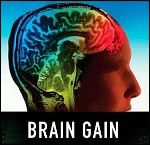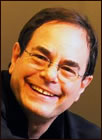door Pedro de Bruyckere
 Het klinkt misschien voor sommige mensen raar dat ik het nieuwe boek van Marc Prensky wil bespreken, omdat ik de voorbije jaren me publiekelijk erg kritisch uitsprak over een van belangrijkste concepten die de man ooit bedacht: de digital natives. Maar het is niet omdat een begrip na het bedenken weerlegd werd, dat het in oorsprong niet een interessant gegeven was. Verwacht je dus geen afbreek-recensie, integendeel, ik las het boek zeer welwillend, ondanks de titel Brain Gain. Het boek zet je namelijk met deze titel op het verkeerde been …
Het klinkt misschien voor sommige mensen raar dat ik het nieuwe boek van Marc Prensky wil bespreken, omdat ik de voorbije jaren me publiekelijk erg kritisch uitsprak over een van belangrijkste concepten die de man ooit bedacht: de digital natives. Maar het is niet omdat een begrip na het bedenken weerlegd werd, dat het in oorsprong niet een interessant gegeven was. Verwacht je dus geen afbreek-recensie, integendeel, ik las het boek zeer welwillend, ondanks de titel Brain Gain. Het boek zet je namelijk met deze titel op het verkeerde been …
Het boek heeft weinig of niets te maken met neurologie, integendeel. Terecht merkt Prensky op dat we de laatste jaren heel veel nieuws hebben ontdekt in deze wetenschapstak, maar dat elke neuroloog je zal beamen dat het nog maar een fractie is, een begin. Hij waarschuwt ook voor te snelle conclusies en blijft dus weg van de neurologie.
De breinwinst waar Prensky het over willen hebben, heeft alles te maken met hoe technologie ons leven makkelijker maakt en een natuurlijke uitbreiding is van ons kunnen en denken Download candy crush saga. Het draait voor hem hoe je mens en technologie optimaal combineert.
Het boek wil zo een tegengif zijn tegen de vele boeken die de voorbije jaren verschenen over de negatieve invloed van technologie op ons boek zoals Nicholas Carr die stelt dat internet ons dommer maakt of Sherry Turkle die beschrijft hoe internet ons eenzamer maakt.
 Het boek draait rond het begrip digital wisdom, het zou fout zijn om dit begrip zomaar te vertalen als mediawijsheid. Het wijs omgaan met allerlei vormen van media is er onderdeel van, maar nu we al bionische ogen en oren ontwikkelen, gaat het bij Prensky verder dan simpelweg omgaan met internet of sociale media. Digitale wijsheid heeft in zijn visie steeds 2 elementen: enerzijds slim omgaan met de technologie anderzijds slimmer worden door technologie.
Het boek draait rond het begrip digital wisdom, het zou fout zijn om dit begrip zomaar te vertalen als mediawijsheid. Het wijs omgaan met allerlei vormen van media is er onderdeel van, maar nu we al bionische ogen en oren ontwikkelen, gaat het bij Prensky verder dan simpelweg omgaan met internet of sociale media. Digitale wijsheid heeft in zijn visie steeds 2 elementen: enerzijds slim omgaan met de technologie anderzijds slimmer worden door technologie.
Zoals steeds heeft Prensky uitgebreid aandacht voor onderwijs, waarbij hij een vraag stelt die ik ook deel: hij pleit voor een discussie over het wat in het onderwijs. Waarbij we ons vaak concentreren op de vraag hoe technologie ons onderwijs kan veranderen of verbeteren, vergeet men te vaak de vraag naar de inhoud van het curriculum vote for siri. De aanzet die Prensky geeft met opvallende stellingen als moet men nog leren (cursief) te schrijven of zijn al die oude wiskundige stellingen nodig als we ook kunnen leren coderen, zal veel mensen provoceren.
Zelf denk ik dat hij hier toch te ver gaat en de bewarende functie van onderwijs vergeet. Ik las dat hij nu werkt aan n boek of artikel rond een zero based curriculum, wat moet we leren als alles opzoekbaar is. Hier negeert hij wat we ondertussen weten over leren en digitale vaardigheden, namelijk dat we ironisch genoeg nog meer kennis nodig hebben. In dit hoofdstuk is hij zowat de anti-Furedi. Toch delen ze het belang van de leerkracht en de ondersteunende rol die technologie heeft.
Een vaak gehoorde klacht is dat Prensky de zaken soms te eenvoudig voorstelt. Zelf ontdekte ik vaak nuances in het verhaal, alhoewel ik soms het gevoel had dat hij aan cherry-picking doet in de bronnen die hij gebruikt. Het positieve aan het boek is dat het aan het denken zet en uitnodigt tot discussie adobe photoshop elements 2020 herunterladen. Als ik al een belangrijk punt van kritiek heb, is dat de tekst zeker in het eerste theoretische deel wat drammerig over kan komen door de overvloedige voorbeelden en herhalingen. De vragen die hij echter stelt over de toekomst zijn een prima basis voor verder denken en verdere discussies, wat voor mij een belangrijke verdienste is.
Oja, nog 1 opvallend element, Prenzki verlaat zelf in dit boek de metafoor van digital natives in dit boek en erkent de vele onderzoeken en kritieken die hij kreeg. Hij ziet zelf dit beeld als onbruikbaar geworden. Ook hier geef ik de man gelijk ;).
 Pedro De Bruyckere is pedagoog en onderzoeker aan de Arteveldehogeschool. Hij schreef samen met Bert Smits de boeken De Jeugd is Tegenwoordig en Is het nu generatie X, Y of Einstein. Hij blogt dagelijks op www.xyofeinstein.be en wekelijks in het Engels op TheEconomyOfMeaning.com.
Pedro De Bruyckere is pedagoog en onderzoeker aan de Arteveldehogeschool. Hij schreef samen met Bert Smits de boeken De Jeugd is Tegenwoordig en Is het nu generatie X, Y of Einstein. Hij blogt dagelijks op www.xyofeinstein.be en wekelijks in het Engels op TheEconomyOfMeaning.com.
reactie Marc Prensky
De redactie van ICTnieuws.nl heeft de recensie (die door Pedro de Bruyckere zelf vertaald is) voor een reactie gestuurd naar Marc Prensky zelf.
Hi Louis
I am very happy that the message I tried to convey in Brain Gain came through clearly to the reviewer.
My goal in writing Brain Gain was to highlight the positive effects technology is having on humans. We all live in an incredibly fast-evolving (and I believe improving) world at the technology level. But to those whose daily lives seem much the same the changes often annoy. Hence their negative reactions to technology.
I believe it is important to keep searching for useful metaphors to help our understanding of our evolving man-machine world. Digital natives and digital immigrants was one such metaphor which helped many people understand what was happening over the last decade. But as technology continues to evolve, new metaphors are needed to understand what we are all going through. So I now offer the metaphor of digital wisdom.
I don’t disagree with the reviewer that there are a great many things from the past that are still useful and important to conserve—I would be the last to throw out all of human culture! But there is now far too much of it for us to be able to conserve in our heads even the percentage we could in the recent past, and so it is time to make new choices. Today we face important and difficult issues in deciding what things to keep in our minds—and curricula—and what to place into our now much-more-easily-retrievable reference. It is one thing to say “we need to know about the ‘giants’ whose shoulders we stand on.” But exactly what, and how much, each of us needs to know about each of them is very much open to context, and the availability of storage.
In some cases, things that were considered “basic” skills and knowledge—even into the 20th century—really no longer are. Calculation is a good example—despite the fact that we have all been taught to calculate for so long, the “basic” skills of mathematics are not, in fact the calculating – the truly basic skills of math are understanding the problem, translating it into mathematical terms, and checking the answer for validity. Actual computation—once one understands the concepts—is best performed by, and left to, machines—just as keeping time accurately, writing legibly, bookkeeping, and data analysis now typically are, for example. What is needed today is the wise brain-machine symbiosis, which is what I call “digital wisdom.”
Another key issue is how to communicate the ideas of the past using the tools and language of the present and future. Here I find the metaphor of ‘verbs” and nouns” useful. The traditional skills, or “verbs” that people need to know— i.e. thinking critically, understanding, evaluating, communicating (the list is long)—remain the same. But the tools people use to learn and perform these skills (i.e. the “nouns”) now evolve rapidly. We no longer have only teacher and books, for example, as educational tools. In education, we need to stay as up-to-date as possible and practical in terms of the “nouns” we use for learning and performing each of the “traditional” verbs, just as scientists and doctors do.
We need to understand that there are big changes taking place in how we communicate and use “traditional” ideas in our new technological context. As an example, the other day I heard someone use the term “res ipsa loquitur” a term that I had never heard of. But I learned all I needed to know in a less than a minute on Wikipedia. I certainly didn’t need to have taken years of Latin, (as some still advocate); Wikipedia, which some question, was perfectly sufficient and accurate. Our difficulty in accepting many of the available new and better solutions to our “past-future” issues is holding us back greatly.
Another example of a very important “basics” question that I see confusing many people—particularly educators—relates to the skills of reading and writing. Those abilities are obviously still of great importance, but It is crucial, I believe, to view reading and writing as “nouns”, rather than as verbs. True, those particular nouns (tools) have, for hundreds of years, been our best way to communicate and store ideas. But that doesn’t make them indispensable forever—in the long run they will be replaced by better means of communicating. In fact, this is already starting to happen: television has taken over much of the communication task previously done by print; short video (e.g. You Tube) has already taken over much of the “how-to” function that used to be done in books; simulations are quickly replacing text explanations as the best way for people to understand dynamic systems.
I believe that in order for our education (and capabilities) to truly meet peoples’ needs in the present and future, technology needs to be viewed by all—especially educators—as precisely the same kind of “foundation” that reading and writing have been in education for the last several hundred years. That is, technology needs to be integrated into, and support, everything we do. Although the implementation is not trivial, we shouldn’t be even questioning technology’s foundational role any more than we question whether writing and books are necessary—which we all no longer do. But it is worth reminding ourselves that people—including Socrates—did question this at first.
Regarding the criticism by some that I “simplify” too much: What I actually attempt to do, rather, is to follow the recommendation that “things should be as simple as possible, but no simpler” (often attributed to Einstein). I do not want to make things more simple than is required for understanding and useful action, but I DO want to remove much of the unnecessary complication and baggage that time has added, and to which many people unnecessarily cling. Of course what is truly necessary is debatable—but this is a debate we desperately need to have, and that I hope to encourage.
This debate is particularly necessary in formal education, because—given its limited duration— in order to have room for the needs of the future we need to cut out much of the traditional trappings and now-useless elements in our curricula that have been gradually added and built up over centuries. We need to seriously and carefully question our traditions and personal preferences, and rethink what is really important for our kids to know for their lives and future.
That is what I am trying to do in my next book.
Thanks and best to all,
Marc